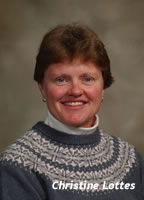TEACHABLE MOMENTS
IN THE MIDST OF TRAGEDY
written by Dr.
Christine Lottes 
An alleged assault by female field hockey athletes against
a female alumnus at Bloomsburg State University (BSU)…
Allegations of sexual assault surfacing from actions in the
past by a male football coach at Pennsylvania State University
(PSU)…
These are tragedies that give rise to intense emotions and
questions that give rise to more questions. Students on campuses
begin talking and trying to process confusing and unthinkable
acts of violence by individuals connected to sport. It isn't
just a chapter on violence or media or politics in a Sport
Sociology textbook. Nor is it yet a case study in an Ethics
textbook. And it can't currently be found in a Sport Psychology
textbook as a situation to be dealt with by an athlete and
a team through "focusing" or "cognitive restructuring."
But it IS all of this, and it is a teachable moment where
students tune in as never before and engage each other in
learning with an intensity that goes beyond the normal theoretical
discussion of these textbook topics.
As a professor at a sister school of BSU, and in the same
state as PSU, I have spent the past weeks using these tragedies
as teachable moments in my Sport Sociology, Sport Ethics and
Sport Psychology courses. I've set up strict parameters in
each class for discussion, as we are not here to gossip or
judge. We are here to learn from what has happened, and what
is reported in the headlines each day. How we looked at the
BSU and PSU cases was dependent on the class focus.
In Sport Sociology the assignment was to take either the
BSU or PSU unfolding story, gather what facts were presented
thus far by the university and the police through media reports,
and then apply all of the sport sociology topics that were
part of the situation. Students came up with violence, media,
politics, sport and children, deviance, gender, economics,
power, and as the mid-field, pre-game prayer at the PSU and
Nebraska football game demonstrated, religion.
In Sport Ethics the incidences became current case studies,
albeit incomplete and unfolding ones. Students analyzed the
ethical dilemma(s), how moral dimensions related to the case,
conclusions and resolutions to problem(s) the case presented,
the decision making style they would use, and the model used
in decision making when analyzing the case.
In Sport Psychology students put themselves into a coaching
role of either of the teams impacted at BSU or PSU. Using
information they'd learned this semester, they came up with
a plan to prepare their team for the next competition taking
into consideration arousal, stress, anxiety, relaxation, energization,
group cohesion, imagery, concentration, self-talk, goal setting
and leadership.
Class discussions were highly interactive with a queue needing
to be kept for who would talk next. Emotions sometimes ran
high. Some students knew athletes on the teams at BSU and
PSU. It is not unlikely that some students have been "victims"
themselves in the past. But because these incidences were
current and "close to home," students were motivated
to grapple with concepts that during other semesters were
at times merely theoretical…but now were real, practical,
current.
Was it worth changing the syllabus for a few days in mid-semester?
Yes. This teacher's hope is that students are able to think
critically and then make good decisions in their own lives,
both now and in the future. Time will tell if when the test
comes to each of our graduates to do the right thing,
if seizing and acting on these teachable moments at a university
in Pennsylvania during one of the most tragic hours in athletic
history, results in better life choices for our students and
for all whom they impact as sport managers.
Dr. Christine Lottes is a professor at Kutztown University
of Pennsylvania in the Department of Sport Management.
(back
to pelinks4u homepage) |




